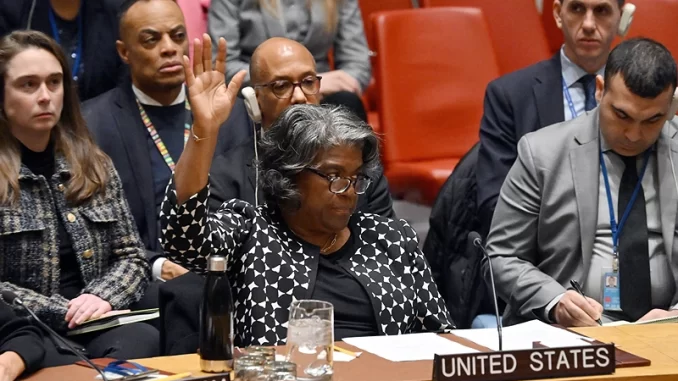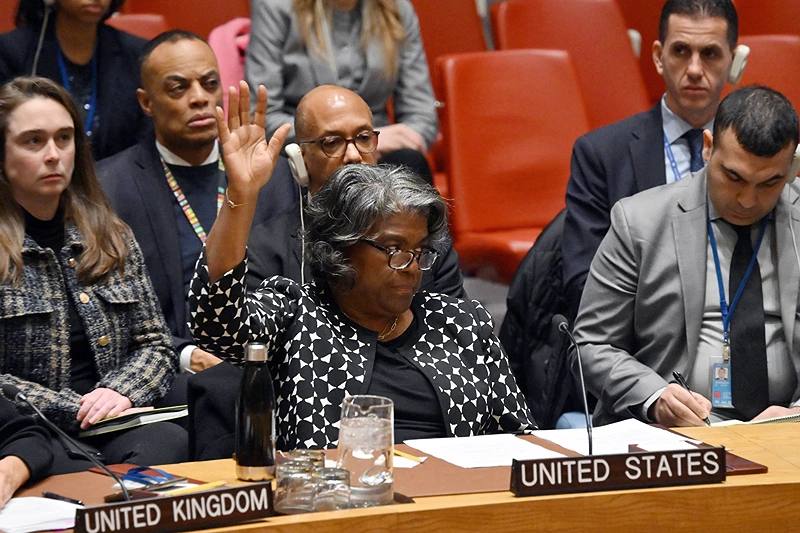

OAN’s Brooke Mallory
1:02 PM – Wednesday, February 21, 2024
A resolution at the United Nations (UN) urging for a ceasefire in Gaza has been vetoed by the U.S., an expected move that shows American dissatisfaction with the war due to the fact that Hamas has still not returned the captive Israeli hostages.
Advertisement
Although the U.S. and Biden administration had previously insinuated that it would veto the Algerian resolution, Biden has since become more critical of Israel’s actions in Gaza. On Monday, a U.S. Security Council draft resolution was put out that asks for a “temporary ceasefire” in the ongoing conflict.
Furthermore, the resolution firmly cautions Israel from initiating an attack on Rafah in the southern part of Gaza.
The government had refrained from using the word “ceasefire” for months. However, President Joe Biden’s recent use of the language and the most recent U.S. resolution indicate a change as the White House attempts to assist in mediating an agreement between Israel and Hamas that would see the release of Israeli detainees and a protracted cessation of hostilities.
The U.S. ambassador to the UN, Linda Thomas-Greenfield, informed the Security Council that the U.S.-rejected resolution presented by Algeria would have detrimental effects on the ongoing negotiations in the area.
“Proceeding with a vote today was wishful and irresponsible, and so while we cannot support a resolution that would put sensitive negotiations in jeopardy, we look forward to engaging on a text that we believe will address so many of the concerns we all share,” she said after the vote.
According to a transcript of a phone conversation between the two leaders, Biden said earlier this month that the IDF’s actions had been “over the top.” He then informed Israeli Prime Minister Benjamin Netanyahu that the military operation in Rafah “should not proceed without a credible and executable plan for ensuring the safety of and support for the civilians.”
On Friday at the White House, Biden deliberately made use of a phrase that his administration had previously opposed using in order to inform Netanyahu of his view “that there has to be a temporary ceasefire” in order to “ensure the safe release of hostages still held by Hamas.”
Despite criticizing the Algerian resolution, the U.S. rep understood that a large portion of the globe wanted to see action at the UN, according to another unnamed official who spoke to reporters on Tuesday. For this reason, the U.S. resolution that is competing aims to provide an “affirmative vision.”
“We’re saying we hear the calls for UN Security Council action,” the official continued.
Additionally, the official told reporters that a vote on the U.S. resolution is unlikely to happen this week because the administration is “not in the mood” to rush matters in light of the ongoing negotiations with Egypt and Qatar, which it believes will be more successful in rescuing Israeli hostages from Gaza, bringing in humanitarian aid, and putting an end to hostilities.
“We just weren’t able to support a resolution today that was going to put sensitive negotiations in peril– and that’s what we believe this resolution would do,” White House National Security Council spokesman John Kirby told reporters on Tuesday.
The vote on Algeria’s proposed legislation took place on Tuesday ahead of the planned Israeli attack in Gaza’s southernmost city of Rafah, where over 1.5 million Palestinians are allegedly crowded into cramped quarters.
“Under current circumstances a major ground offensive into Rafah would result in further harm to civilians and their further displacement including potentially into neighboring countries,” a draft of the U.S. resolution reads, adding that “such a major ground offensive should not proceed under current circumstances.”
Despite a high-level conference in Cairo last week with intelligence heads from the U.S., Israel, Egypt, and Qatar, the negotiations over a hostage release and humanitarian pause have not resulted in a breakthrough.
“We want a deal very much and we know we need to pay prices. But Hamas’ demands are disconnected from reality – delusional,” Israel’s Coordinator for the Captives and the Missing, Gal Hirsch, told CNN Saturday at the Munich Security Conference in Germany.
Hirsch stated that in order to demonstrate that Hamas will follow through on its commitments, Israel needs evidence that the medication that was shipped to Gaza for the detainees has truly reached them.
On Tuesday, Hamas commanders positioned outside of Gaza returned to Cairo for additional discussions, while White House Middle East Coordinator Brett McGurk is making a return to the region.
According to the U.S. official, McGurk is scheduled to visit Israel on Thursday and Cairo on Wednesday. The hostage negotiations will be a major component of the trip.
Stay informed! Receive breaking news blasts directly to your inbox for free. Subscribe here. https://www.oann.com/alerts

